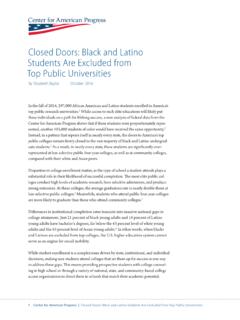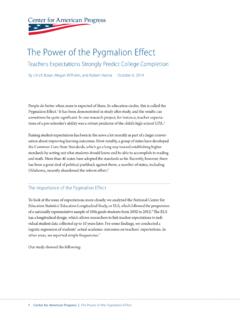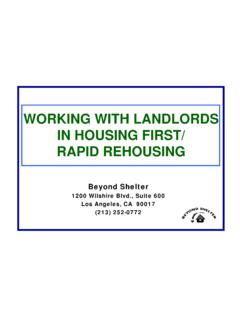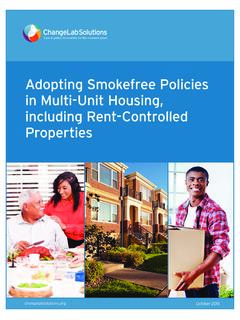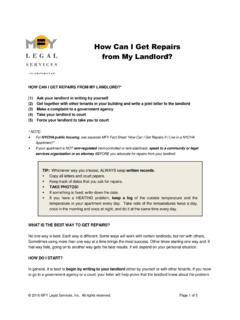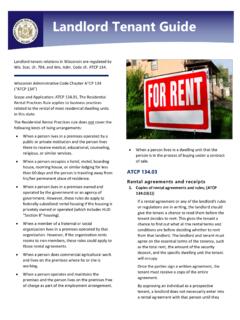Transcription of 5 Ways America’s Newest Landlords Can Win the Public’s Trust
1 1 Center for American Progress | 5 ways america s Newest Landlords Can Win the Public s Trust5 ways america s Newest Landlords Can Win the Public s TrustBy Sarah Edelman and Julia Gordon December 18, 2014 Over the past three years, large investors have bought more than 380,000 homes1 that became available due to the foreclosure crisis. These investors now face a new challenge: building Trust with the public. Analysts and community groups have viewed the emergence of single-family rental companies as presenting both opportunities and risks. With a shortage of quality rental housing stock, particularly affordable rental units, the country needs the rental housing these companies can help bring online.
2 At the same time, however, these firms have also encountered suspicion and distrust. News stories about high eviction rates and sub-standard property conditions abound, and several high-profile lawsuits have been filed against prominent, single-family rental The resulting damage to a com-pany s reputation or brand could make it harder for firms within this industry to attract investors and to expand into new communities in the future. One concern often raised by analysts, advocates, and local officials is whether these purchases are a short-term trade meaning that companies are buying houses at low prices and planning to sell as soon as housing prices rise further or whether compa-nies are in the rental business for the long haul.
3 Another concern is whether the firms will prove to be good neighbors: Are they pushing up rents and siphoning wealth from communities, or are they helping provide quality housing at reasonable rents and investing in the neighborhood? These concerns exist at a time when distrust of Wall Street s involvement in housing is already widespread. Before and during the foreclosure crisis, the public watched com-panies take steps to maximize their own profits apparently without regard for the social and economic costs of their practices. After the housing market crashed, many com-panies, including some financed by Wall Street investors, bought homes at historically low prices sometimes, directly from taxpayer-funded federal or state agencies.
4 Going forward, in order to build Trust with the public, this new industry must demonstrate emphatically that professional, single-family rental firms are good allies to renters and communities alike and not in business simply to maximize short-term profits without regard for longer-term prospects or social and economic costs. 2 Center for American Progress | 5 ways america s Newest Landlords Can Win the Public s TrustIn a sign that the industry recognizes the importance of its collective reputation, a num-ber of the largest single-family rental firms have joined together to form a trade group called the National Rental Home This group recently published a set of man-agement standards designed to support its claim that it can offer better tenant experiences than traditional Landlords , such as mom-and-pop owners who manage a handful of prop-erties.
5 The standards, which members of the trade group have committed to following, address issues such as home rehabilitation, property management, and resident While these guidelines are an important step, they largely advise firms to comply with existing law. Yet acting lawfully is not enough: Many states offer few legal protections for renters, and it is worth remembering that much of the predatory lending during the mortgage boom was technically legal. When laws governing certain business practices are lax or nonexistent, companies must set standards beyond the legal minimum to act responsibly.
6 Acting responsibly is even more important for the single-family rental industry if these companies hope to demonstrate that they are, as industry leaders say, a major part of the nation s solution to the foreclosure and rental affordability crisis, rather than a source of additional strain on , in addition to adhering to the law and to the new trade group guidelines, the Center for American Progress recommends that companies in the emerging, investor-owned, single-family rental industry go the extra mile to demonstrate that they are com-mitted to managing homes responsibly, treating tenants well, and contributing to the economic and social well-being of the neighborhoods where they own homes.
7 Companies should adopt the following five recommendations to enhance their reputa-tions and support the neighborhoods where they operate. Most of these standards are good practices that all Landlords large and small, single and multifamily should follow, while a few are targeted specifically toward Landlords who own large portfolios. There may be a financial cost associated with some of these recommendations, but we believe that companies can still be profitable while committing to good practices and affordability. Following these recommendations will help ensure this industry s long-term viability.
8 Commit to core tenant protectionsCertain basic protections can help renters feel stable and secure in their homes. These protections will become even more important as our nation s renting population grows and more families do not have access to the protections associated with owning their own home. The United States gained about million renters between 2008 and 2013, and experts estimate that at least another 4 million households will begin renting over the next 3 Center for American Progress | 5 ways america s Newest Landlords Can Win the Public s TrustSome jurisdictions, particularly those in the Northeast and in parts of California, have core tenant rights on the books that protect renters from certain abuses, including unjust eviction or sharp rent increases.
9 Some jurisdictions also give renters a reasonable buffer between a missed payment and an eviction. Many states, however including states where the number of renters living in single-family homes has grown significantly over the past few years do not provide renters with adequate protections. This leaves them vulnerable to abusive landlord conduct, including having their rent raised significantly and with little notice or being subject to eviction if the rent check is just a few days late. Some of the larg-est single-family rental companies own high concentrations of homes in Georgia, Arizona, Florida, and Texas all states that do not provide renters with these basic single-family rental companies should signal their commitment to renters by offering leases with strong tenant-protection provisions, whether or not state law guar-antees those protections.
10 We suggest the following standards. Companies should not terminate leases without good cause and should offer longer-term optionsSingle-family rental companies should allow tenants to stay in their home as long as they pay their rent and follow the rules of their rental agreement. While renting families gen-erally have good cause eviction protection in some Northeast states as well as in parts of California which allows them to stay in their rental home as long as they are follow-ing the rules of their rental agreement8 this protection is less common in many of the jurisdictions where single-family rental companies have purchased the largest number of properties.






